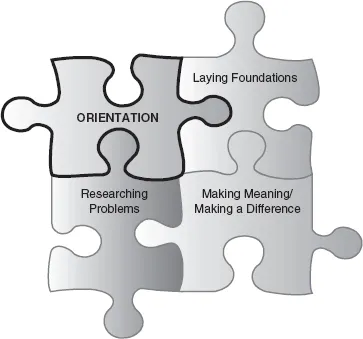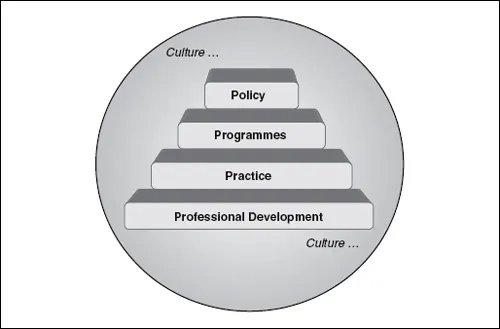![]()
Part One
Orientation to Researching Real-World Problems
1 Researching Real-World Problems
This introductory chapter argues the relevance and need for research that grapples with real-world problems. It discusses the practical and ‘applied’ nature of most research projects and highlights the challenges and payoffs associated with research that attempts to address significant real-world issues.
![]()
1
Researching Real-World Problems
Chapter Preview
Grappling with Problems
The Role of Research in Problem Solving
The Potential of Researching Real-World Problems
The Challenge of Researching Real-World Problems
Preparing to Make a Start
‘We are at the very beginning of time for the human race. It is not unreasonable that we grapple with problems … Our responsibility is to do what we can, learn what we can, improve the solutions, and pass them on.’
– Richard Feynman
GRAPPLING WITH PROBLEMS
You’ve probably already picked up on this, so I don’t think I’m telling you anything new, but in case you hadn’t noticed – the world is not a perfect place. Problems abound.
Governments are riddled with problems – in fact, governments themselves are a problem! The environment’s a mess. Our planet is turning into one giant greenhouse, there’s salinity in the soil, and we don’t have enough clean/safe drinking water to go around. In fact, we can’t find a way to distribute money, food, or medicine so that everyone with a need can get a share. Health care and education are far from adequate and/or equitable, and from the global arena to the local playground we can’t seem to overcome racism, sexism, prejudice or discrimination. Domestic violence and child abuse occur daily in every corner of the world, and child pornography is a multi-billion dollar industry.
We also have to deal with the threat of terrorism as well as our fear of that threat. We poison ourselves daily with toxic chemicals – from alcohol, cigarettes, factories and automobiles. Children are starving – some due to war and political upheaval – some from mass media-induced anorexia. Meanwhile schools struggle with violence, drugs, sexual and racial tension.
And don’t get me started on the workplace … Did you know that more than 5,000 people die every single day due to work-related accidents and disease (International Labour Organization 2005)? Meanwhile, we ‘survivors’ deal with significant stress from the boss, massive bureaucratic inefficiencies, gross inequities, and the need to balance work with a thousand other responsibilities.
Yep – there are a lot of real-world problems we can grapple with.
From problems to problem solving
Now that may sound pretty depressing, but don’t despair. We may live in a world plagued by problems – but we also live in a world dedicated to learning, changing, improving and evolving. Yes, problems abound – but so does problem solving and problem solvers. We are part of a world surrounded by people who work in government, in education, in health care, in big business, in small business, in the community, in academia etc., all dedicated to doing their part to ease, fix and alleviate problems. In fact, we live in a world where most struggle on a daily basis to solve problems in order to make the world, or at least their world, a better place. So okay, we may never live in a problem-free world, but at least we can say we live in a world where alleviating problems will always be high on the agenda.
THE ROLE OF RESEARCH IN PROBLEM SOLVING
So what is the role of research in problem solving? Well, research is the process of gathering data in order to answer a particular question(s); and when researching real-world problems the questions asked generally relate to a need for knowledge that can facilitate decision-making, thereby aiding problem resolution.
Does this then make research the answer to our problems? Well unfortunately no – but research can be an instrumental part of problem resolution. Research can be a key tool in informed decision-making. It can be central to determining what we should do, what we can do, how we will do it, and how well we have done it. Research may not be the answer to our problems, but it can supply some of the data necessary for us to begin to tackle the real-world problems that challenge us all.
Take change management literature as an example. It will clearly tell you that in order to make change happen – in order to solve problems – you need to:
- understand the problem – including all the complexities, intricacies and implications
- be able to find workable solutions – vision futures, explore possibilities
- work towards that solution – implement real change
- evaluate success – to find out if problem solving/change strategies have been successful
If you think about it, all of these activities can be, and should be, informed by research. Research can be the key to finding out more, that is, uncovering and understanding the complexity of real-world problems. It can also help us in our quest for solutions. It can be key to assessing needs, visioning futures, and finding and assessing potential answers. It can also allow us to enact and learn from change through use of ‘action research’ strategies. And finally, evaluative research can be central to monitoring and refining our attempts at problem solving. In short, research may not be the answer – but it’s certainly a tool that can help us move towards problem resolution.
Researching practical problems
Precisely because (1) there are so many ‘problems’ out there, (2) there is a true dedication to problem solving from global to local scales and (3) research is recognized as central for effective and informed decision making, there is a real call for ‘applied’ research, or research expressly designed to contribute to solving practical problems.
Now keep in mind that while we would all like to save the world’s children from hunger, do away with the evils of terrorism, or put a stop to religious persecution, not many of us will be in a position to fully address these types of problem through research processes. Generally speaking, researching real-world problems will see you engaged in problems, or aspects of problems, that while still important and significant, are local, grounded and practical. Researching real-world problems is doing research that responds to real and tangible everyday needs. So whether it be local or national government, non-government organizations, aid agencies, communities, corporations, or in fact any workplace, if there are problems to tackle, then there is a need for research that can aid problem resolution.
So who can benefit from research that tackles real-world problems? The list is endless. For example:
| Educators trying to improve their practice, trying to bring equity to a school system, trying to motivate students, trying to get a handle on bullying … |
| Nurses, who know their insights can make way for better practice – if they can only find a way to be heard … |
| Doctors, at least the few out there who don’t believe they already know it all! |
| Communities trying to deal with adolescents with nothing to do but hang around, or trying to protect a local park from corporate development … |
| People working in local government, who want to listen to community needs, improve the state of the environment, improve community facilities … |
| Social workers trying to get a handle on the problems facing twenty-first century families, the unemployed, and the abused … |
| Managers trying to improve what they do and what their company offers, trying to provide safe, healthy, stress-free workplaces, as well as trying to increase profits … |
| Aid agencies, who recognize the value of listening before acting, or those who need to know if their programmes have worked … |
| Governments, who recognize the need for research that can contribute to major public policy debates … |
THE POTENTIAL OF RESEARCHING REAL-WORLD PROBLEMS
‘We are continually faced with a series of great opportunities disguised as insoluble problems.’
– John W. Gardner
There is a good reason why so many people are interested in conducting research into real-world problems. And that’s because the findings, results and conclusions can lead to practical recommendations, genuine change, great opportunities, and real problem solving. As shown in Figure 1.1, research into real-world problems can, and should, open possibilities for change on a number of levels.
FIGURE 1.1 HIERARCHY OF CHANGE
Figure 1.1 depicts a hierarchy of change with a foundation based on professional development. The thinking here is that the process of conducting research is in itself a learning journey that should have an impact on the researcher; conducting research is professional development. The next level up is research that can impact on practice; it is research that can provide data that will allow individuals, organizations, or communities to reflect on, and refine what it is that they do. Moving up another level is programmes. The emphasis here is on a more systemic attempt to change the projects, procedures, plans and strategies used within organizations and communities. And finally, sitting above programmes is policy; here the research goal is to make a contributio...



